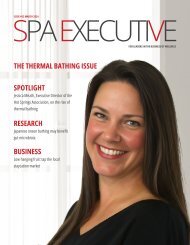Create successful ePaper yourself
Turn your PDF publications into a flip-book with our unique Google optimized e-Paper software.
Scientific proof that massage can<br />
reduce stress during the holidays<br />
The holidays can be a stressful time, even if<br />
you love the season.<br />
A survey conducted last year by the American<br />
Psychological Association found that 38% of<br />
people said their stress levels increased over<br />
the holidays and that this affect was more<br />
marked in women than in men (44% vs 31%).<br />
Other surveys have found that much higher<br />
numbers — as many as 90% — of people get<br />
stressed out over the holidays about a variety<br />
of things. These include money, weight gain,<br />
crowds and long lines, travel, and spending<br />
time with relatives. And this stress can have<br />
real consequences on both physical and<br />
psychological wellbeing.<br />
Fortunately, the massages offered at your spa<br />
can help your guests cope with the<br />
skyrocketing stress levels associated with the<br />
most wonderful time of the year. If people are<br />
looking for scientific evidence that massage<br />
can reduce stress, here is a roundup of<br />
findings about the effects of different<br />
applications of massage – including<br />
reflexology and facial massage – on stress<br />
and anxiety levels.<br />
Massage therapy decreases stress and<br />
anxiety<br />
Researchers at the Touch Research Institutes<br />
examined studies on the effects of massage<br />
therapy on biochemistry, including decreased<br />
cortisol and increased serotonin and<br />
dopamine levels. The research reviewed<br />
included studies on depression, pain,<br />
auto-immune conditions, HIV, breast cancer,<br />
and stress from work, aging, and pregnancy.<br />
In studies in which levels of the stress<br />
hormone cortisol were measured, significant<br />
decreases, averaging 31%, were noted. In<br />
studies measuring the neurotransmitters<br />
serotonin and dopamine, both of which<br />
contribute to feelings of happiness and<br />
wellbeing, an average increase of 28% was<br />
noted for serotonin and an average increase<br />
of 31% was noted for dopamine. The authors<br />
19 | <strong>Spa</strong> <strong>Executive</strong> Technology


















